
Content warning: this story includes information about child sexual abuse that may be distressing to some readers.
Australian research has found that around one in six Australian men reports sexual feelings towards children.
This was the headline splashed across the country earlier this month reporting on a new study, one of the largest of its kind in the world, that looked at child sexual offending behaviours and attitudes among Australian men.
The research, which was lead by the University of New South Wales, surveyed nearly 2,000 men and uncovered more disturbing statistics: around one in 10 Australian men have sexually offended against children, amounting to around one in five Australian men who report sexual feelings for children and/or have sexually offended against children.
The study used the benchmark of 18 years of age to define sexual offences or feelings, as the age of consent varies across jurisdictions. However, the research also asked specifically about sexual feelings towards younger ages and found that around four per cent of men said they would have sexual contact with a child under the age of 10 years old "if no one would find out".
Dr Michael Salter, the lead author of the study, tells Mamamia he was unsurprised by the statistics that the research uncovered.
"We constantly talk about child sexual abuse being a public health emergency and it can only have the massive health and social impact it has if there's a significant amount of perpetrators," Dr Salter says.
According to a landmark study published in April of this year, around 28.5 per cent of Australians aged 16 to 65 years old report having experienced child sexual abuse.

Top Comments